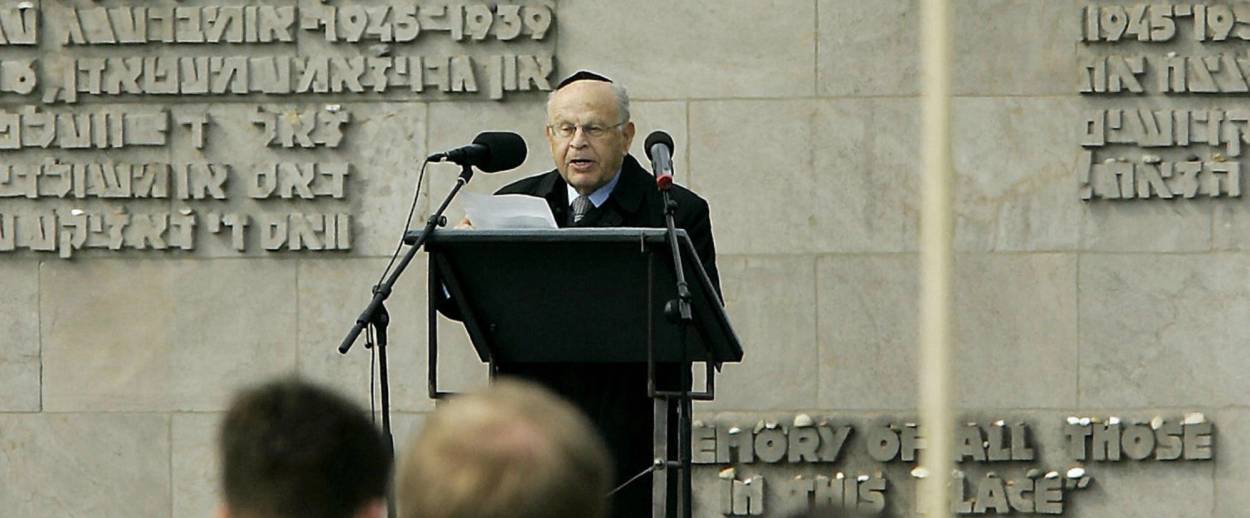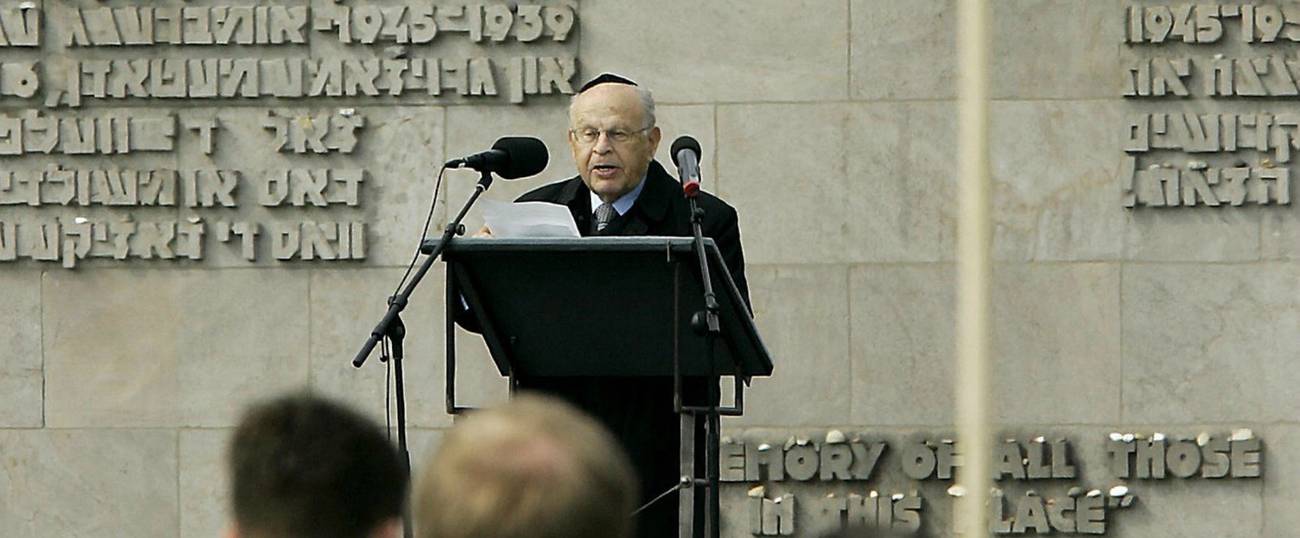Farewell to Sam Bloch, Champion of Holocaust Survivors
From fighting with the partisans to working to preserve the memory of the Holocaust, my father in law was a tireless defender of the Jewish people




Sam E. Bloch, who died on February 4, 2018 at the age of 93, was one of the foremost leaders of the survivors of the Holocaust. The following eulogy was delivered at his funeral at Park Avenue Synagogue in New York City on February 6, 2018, by his son-in-law Menachem Z. Rosensaft.
It is not an empty phrase when we keep on saying that ‘Remembrance is the key to our survival.’ If we have survived, it is only because of our endurance and spiritual strength which emerged with dignity from the ashes of Treblinka and the mass graves of Belsen. Our endurance symbolizes the history of our people and its remarkable resilience through 2000 years of desperation and persecution.
Our tenacity manifested itself immediately after the Liberation in the dynamic Jewish life in the DP camps. Who does not remember the extraordinary vitality and creativity of our people, just emerging from Nazi hell? Who does not recall their heroic deeds in the post-war years of flight and rescue, ha’apala and aliya, and their participation in the struggle for national redemption in the Jewish homeland? The survivors harbored in their hearts not only the sorrow of their own losses, but a deep Jewish pride, which they carried along with fruitful dynamism wherever they built new homes. In Israel and in the Diaspora as well, the survivors’ contribution to all Jewish causes and their achievements in their private lives is an inspiring story yet to be told.
These words were spoken by our beloved, unforgettable Sam Bloch on Wednesday, June 17, 1981, in front of the Knesset in Jerusalem during the historic World Gathering of Jewish Holocaust Survivors. They encapsulate perfectly his philosophy of life, his forward-looking, always optimistic mindset, which enabled him to be not just a visionary but also a creative force. For Sam, the Biblical injunction, “na’aseh v’nishmah”–we will do and we will listen–or learn, or understand–was often reversed. He listened, and learned, and understood, and then he dedicated himself wholeheartedly to implementing the often abstract visions of a better, more fulfilling, more ideal future.
It is impossible to capture in a few minutes Sam’s life and tremendous, multi-faceted accomplishments. And it is impossible for me, his son-in-law, his friend, in recent decades his colleague in a variety of enterprises, to do justice to all that Sam represents not just for me but for all of us. Allow me, therefore, to focus on but a few aspects of the extraordinary life of this extraordinary man whom we were privileged to know and to have in our midst.
The sentiments Sam expressed on the plaza in front of the Knesset 36 and-a-half years ago provide a window into who he was. He was never content with platitudes. Rather, when Sam concluded that something had to be done, he would not rest until he made sure that it was done, and done to perfection. Nor did he ever wallow in self-pity, either for himself or for the Jewish people whom he loved with the same devotion with which he loved his family. In his eyes and in his heart, the future, his future, his family’s future, the future of Am Yisrael, of the Jewish people, was always better than today, and in sharp contrast to the sorrows, the tragedies, of yesterday.
I cannot adequately describe the heroism and fierce determination it took for a not yet 17 year-old teenager to transcend his revered father’s murder by the Germans and set out to save not just himself but his mother, Sonia, and younger brother, Martin. It would have been understandable if he had given in to despair, to anger. It would also have been far easier for him to set out from the ghetto on his own. Instead, foreshadowing his principled behavior throughout his life, he rescued his small family from almost certain destruction, taking them with him and remaining with them, regardless of the risks.
As a partisan with the Bielski Brigade in the forests of what is today Belarus, he fought not just against the enemy, but for redemption, for survival with dignity, with pride, consistent with the Jewish and human values he had been taught by his father.
Later, after the war had ended and Sam, his mother and his brother were in the Bergen-Belsen Displaced Persons camp, he was not content with being one of the thousands who were waiting for others to determine their fate, In short order, he became the youngest member of the Jewish Committee that administered and ran the DP camp under the not always benevolent eyes of the British military authorities. It was there that he forged a lasting friendship with my father, the leader of the survivors in Belsen as well as the British Zone of Germany, a friendship that transformed itself into virtual family when my parents walked Sam to the Huppah when he and Lilly married; a friendship that further cemented itself when Sam and Lilly, my parents, and other Belsen survivors–the Belseners as they called themselves–established the World Federation of Bergen-Belsen Associations in New York in the early 1960’s.
By then, Sam was head of publications at the World Zionist Organization, devoting himself to advocating intellectually and educationally on behalf of the State of Israel. And it was at that time that he allowed me, his friends’ son, to spend time with him, at his office and at Lilly’s and his home, discussing Zionism and politics, history and literature.
When the Belsen survivors decided to celebrate the 20th anniversary of their liberation, it was Sam who organized all the events with a calm perfectionism that belied the enormity of the project. He compiled and edited the monumental volume, Holocaust and Rebirth: Bergen-Belsen 1945-1965, that remains to this day a critical resource for any understanding of the post-war DP years. And he organized the pilgrimage to Belsen, and large-scale events in Israel and New York.
In subsequent years, when he, my father, and Elie Wiesel conceived of a literary award for works perpetuating the memory of the Holocaust, it was Sam who brought the project to international fruition.
On a personal level, our relationship transformed itself yet again, and became even closer, when Jeanie and I married, with our two families literally merging into one.
In 1981 in Jerusalem, and then again two years later in Washington, DC, Sam was one of the key driving forces behind the gatherings of thousands of survivors and their families. On April 13, 1983, this time in front of the U.S. Capitol and in the presence of Vice President George H.W. Bush and Speaker Thomas P. O’Neil, Jr., he said of the victims of the Holocaust and its survivors in words that conveyed his own outlook on both life and history:
The belief in God, in tradition, in humanity, expressed in secret prayers, even in Auschwitz, kept broken spirits from losing their complete faith . . . This is resistance, too. Such was their faith in the ultimate triumph of good over evil, in the eternity of their people, faith in a better world to come – a world which would and should draw proper lessons from the Holocaust for its own sake.
In 1981, Elie Wiesel appointed Sam as chairman of the United States Holocaust Memorial Council’s Board of Advisors as well as a member of its Development, Days of Remembrance, and Content Committees. He was a key founder of the American Gathering of Jewish Holocaust Survivors, serving as its president in more recent years, and was also one of the founders of the International Society for Yad Vashem, and of the American Friends of the Israel Defense Forces. New York City Mayor Ed Koch named him to the Commission that created the Museum of Jewish Heritage, a Living Memorial to the Holocaust. He was also for many years a member of the board of directors of the American Section of the World Jewish Congress.
When the opportunity came to assist impoverished Holocaust survivors, Sam characteristically stepped up to the plate. He served until his death as a director of the Conference of Jewish Material Claims Against Germany; was one of the founders of the World Jewish Restitution Organization; and as Chair of the Jewish Section of the Swiss Humanitarian Fund, he assisted in distributing $180 million to needy survivors.
As president of the World Federation of Bergen-Belsen Associations, he was also instrumental in setting the direction that remembrance would take at the memorial Site of Bergen-Belsen in Germany. Together with his daughter, Jeanie, he curated a traveling photographic exhibition about the DP camp that was integrated into the permanent exhibition in the new museum at Bergen-Belsen. He became the Chairman of the Advisory Council of the Foundation for World War II Memorial Sites in Lower Saxony, Germany, and a member of its Board, speaking frequently at the annual commemorations beside the camp’s mass-graves.
His dedication to Jewish continuity and his lifelong commitment to Zionism merged in his leadership of Beit Hatfutsot, the Museum of the Jewish People in Tel Aviv over the course of four decades. He was one of the founding fathers of Beit Hatfutsot, serving as Chairman of the Museum’s American Friends, and a member of its Board of Governors. In December of 2014, Beit Hatfutsot honored him as a “distinguished guardian of Holocaust memory and Zionist leader who has devoted his life to ensuring the vitality of the Jewish people.”
Throughout all these activities, Sam never lost sight of his absolute priority: his family and his friends, to whom he was wholeheartedly devoted. His beloved Lilly, his daughters Jeanie and Gloria, his grandchildren Jodi, David, and Romy, and his great-grandchildren Hallie and Jacob always came first, as did his brother Martin, his sister-in-law Tatiana, and their family. And they reciprocated that love and devotion in equal measure. Lilly, Gloria and Jeanie, no wife and no daughters could have done more to care for a loved one than you did, enabling Sam to live with dignity, showered with affection, and receiving the very best of care.
Sam was a giant, one of the last of what was truly the “Greatest Generation” who emerged from the devastation of the Shoah not with bitterness and hatred, but with a determination to create new families, and rebuild Jewish life, all the while devoting his energies to perpetuating Holocaust memory and strengthening Jewish identity. He was a lifelong Zionist who dedicated himself to the unity of the Jewish people with the State of Israel at its core. He personified the true meaning of family and friendship in everything he did. Sam was a hero in every sense of the term, and a role model for the ages.
May his memory and all that he embodied and exemplified be and remain a blessing and an inspiration.
Yehi Zichro Baruch.
Menachem Z. Rosensaft teaches about the law of genocide at the law schools of Columbia and Cornell universities and is general counsel emeritus of the World Jewish Congress. He is the author of Poems Born in Bergen-Belsen.